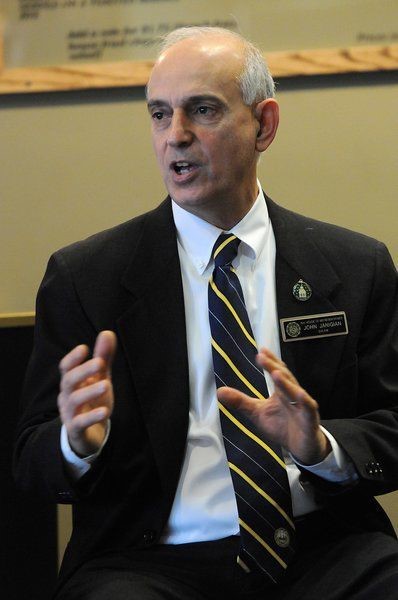
Legislators wary of cost for commuter services from Nashua to Concord

PAUL BILODEAU/Staff photo. State Rep. John Janigian was one of several state legislators who discussed their actions in Concord during a Greater Salem Chamber of Commerce’s legislator breakfast.
SALEM, N.H. — Gov. Chris Sununu may not find support for his regional commuter rail service plans in Southern New Hampshire.
Last week, the governor released a 10-year state transportation plan that includes $4 million to study constructing a commuter rail from Nashua to Concord. He previously had opposed spending money on a rail study while on the Executive Council and during his gubernatorial campaign.
In the state’s recently failed pitch to become a location for Amazon’s second national headquarters, however, Sununu did include plans to connect Manchester with Boston’s transit lines.
The study has been shot down by the state Legislature more than once in recent years, though a 2015 Public Policy Polling survey found that 74 percent of residents are in favor of a transit system.
During a Greater Salem Chamber of Commerce event Monday, several lawmakers said they aren’t in favor of constructing a commuter railway connecting New Hampshire to Boston, or even Nashua to Concord, due to the expense.
“I’m a little befuddled as to why the governor’s suddenly for it,” said state Rep. Betty Gay, R-Salem.
The New Hampshire Rail Transit Authority has previously stated that establishing a transit system could help alleviate traffic congestion and bring economic growth through new jobs, commercial and residential real estate growth, and millions of dollars in reinvested worker earnings.
Democratic Party Chairman Ray Buckley told the Associate Press last week that New Hampshire might have had a better shot with its Amazon pitch if plans for a commuter rail system had been in place earlier.
Both Gay and Sen. Chuck Morse, R-Salem, said they are concerned about the cost of the project.
The problem is not the cost of the study — which is less than one percent of the $185 million annual transportation plan. Rather, the potential costs of building, operating and maintaining a rail system is daunting, Morse said.
A commuter rail system with two stops in both Manchester and Nashua would cost an estimated $72 million to $246 million, depending on the level of federal funding, according to the transit authority.
“I think we’d be doing our state a disservice if we don’t explore all of the facts,” said spokesperson E.J. Powers, who represents the rail authority and businesses advocating for a rail transportation system.
Powers added that a rail system could help the state bring in more workers — another topic of conversation at Monday’s event.
Gay and others voiced concern that the state government would end up subsidizing the system. The Massachusetts Bay Transportation Authority, for example, has faced severe financial trouble over the last several years, including a $7.3 billion backlog of deferred maintenance and an operating deficit of $138 million last year.
Taxpayers would likely get a better bang for their buck by adding an additional lane on Interstate 93, Rep. John Janigian, R-Salem, said.
“I think there’s going to be a huge impasse between rail and no-rail,” he said. “Looking at the composition of where people are on this issue, I don’t think anything’s going to happen.”
Sununu said in a statement that it is now a question for the Legislature to determine whether or not to move forward with the study.
